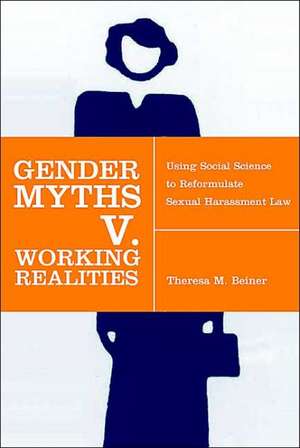Gender Myths v. Working Realities – Using Social Science to Reformulate Sexual Harassment Law
Autor Theresa M Beineren Limba Engleză Hardback – 31 dec 2004
Preț: 432.25 lei
Nou
Puncte Express: 648
Preț estimativ în valută:
82.72€ • 85.87$ • 68.98£
82.72€ • 85.87$ • 68.98£
Carte tipărită la comandă
Livrare economică 22 martie-05 aprilie
Preluare comenzi: 021 569.72.76
Specificații
ISBN-13: 9780814799178
ISBN-10: 0814799175
Pagini: 262
Dimensiuni: 152 x 229 x 15 mm
Greutate: 0.5 kg
Editura: MI – New York University
ISBN-10: 0814799175
Pagini: 262
Dimensiuni: 152 x 229 x 15 mm
Greutate: 0.5 kg
Editura: MI – New York University
Recenzii
"Concentrating on contentious issues such as severity and pervasiveness, reasonableness standards, unwelcomeness, causation, employer liability, and remedies, Beiner highlights the mismatches between the law and empirical research and suggests both legal reforms and research questions to close the gap. Written in clear, compelling prose, the study will enlighten readers curious about contemporary questions in sexual harassment law as well as specialists interested in the intersection of law and social science.
Choice, highly recommended "Fortunately, Beiner is not only a law professor: she also has practiced law and is clearly well acquainted with the difficulties of getting these cases before a jury. Her book seeks to help plaintiffs survive summary judgment so they can prove their cases in court."
Trial Magazine "Beiner's book is a striking example of the thoughtful and clever use of social science research findings to point to changes that will improve the operation of an important US social institution."
Labour/Le TravailGender Mythis v. Working Realities is an innovative and fresh approach to a complex problem. The concept for the book is both fascinating and intriguing."
The Law and Politics Book Review"A readable synthesis of legal rules and real life, accessible to both lawyers and non-lawyers--for all those interested in reducing sexual harassment on the job. Beiner makes a crucial contribution to the discussion of sexual harassment by demonstrating the relevance of social science research to legal doctrine. She convincingly exposes the limited effectiveness of current case law in preventing sexual harassment and demonstrates that federal judges often make decisions based on myths and stereotypes about how people behave, not on the reality women face in the workplace."Martha S. West, University of California Davis, co-author of Sex-Based Discrimination "In this timely and important book, Beiner explores the growing disconnect between judges' unfounded assumptions about how people respond to sexualized conduct in the workplace and what empirical research in the social sciences is telling us about the same subject. In many arenas, the antidiscrimination doctrine emerging from the federal courts is being built on a foundation of 'junk social science.' Beiner shines a light on this problem as it has manifested in the evolving law of sexual harassment."
Linda Hamilton Krieger, Professor of Law, University of California at Berkeley, School of Law"Beiner has done a superb job of reviewing the social science research that applies directly to the law on sexual harassment. Beiner suggests reforms to the legal standard and provides sensible recommendations for interpreting the law to be more compatible with the way people behave when they are sexually harassed."
Barbara A. Gutek, Professor and Eller Chair in Women and Leadership, University of Arizona
"Concentrating on contentious issues such as severity and pervasiveness, reasonableness standards, unwelcomeness, causation, employer liability, and remedies, Beiner highlights the mismatches between the law and empirical research and suggests both legal reforms and research questions to close the gap. Written in clear, compelling prose, the study will enlighten readers curious about contemporary questions in sexual harassment law as well as specialists interested in the intersection of law and social science." --Choice, highly recommended "Fortunately, Beiner is not only a law professor: she also has practiced law and is clearly well acquainted with the difficulties of getting these cases before a jury. Her book seeks to help plaintiffs survive summary judgment so they can prove their cases in court." --Trial Magazine "Beiner's book is a striking example of the thoughtful and clever use of social science research findings to point to changes that will improve the operation of an important US social institution." --Labour/Le Travail Gender Mythis v. Working Realities is an innovative and fresh approach to a complex problem. The concept for the book is both fascinating and intriguing." --The Law and Politics Book Review"A readable synthesis of legal rules and real life, accessible to both lawyers and non-lawyers--for all those interested in reducing sexual harassment on the job. Beiner makes a crucial contribution to the discussion of sexual harassment by demonstrating the relevance of social science research to legal doctrine. She convincingly exposes the limited effectiveness of current case law in preventing sexual harassment and demonstrates that federal judges often make decisions based on myths and stereotypes about how people behave, not on the reality women face in the workplace."--Martha S. West, University of California Davis, co-author of Sex-Based Discrimination "In this timely and important book, Beiner explores the growing disconnect between judges' unfounded assumptions about how people respond to sexualized conduct in the workplace and what empirical research in the social sciences is telling us about the same subject. In many arenas, the antidiscrimination doctrine emerging from the federal courts is being built on a foundation of 'junk social science.' Beiner shines a light on this problem as it has manifested in the evolving law of sexual harassment." --Linda Hamilton Krieger, Professor of Law, University of California at Berkeley, School of Law"Beiner has done a superb job of reviewing the social science research that applies directly to the law on sexual harassment. Beiner suggests reforms to the legal standard and provides sensible recommendations for interpreting the law to be more compatible with the way people behave when they are sexually harassed." --Barbara A. Gutek, Professor and Eller Chair in Women and Leadership, University of Arizona
Choice, highly recommended "Fortunately, Beiner is not only a law professor: she also has practiced law and is clearly well acquainted with the difficulties of getting these cases before a jury. Her book seeks to help plaintiffs survive summary judgment so they can prove their cases in court."
Trial Magazine "Beiner's book is a striking example of the thoughtful and clever use of social science research findings to point to changes that will improve the operation of an important US social institution."
Labour/Le TravailGender Mythis v. Working Realities is an innovative and fresh approach to a complex problem. The concept for the book is both fascinating and intriguing."
The Law and Politics Book Review"A readable synthesis of legal rules and real life, accessible to both lawyers and non-lawyers--for all those interested in reducing sexual harassment on the job. Beiner makes a crucial contribution to the discussion of sexual harassment by demonstrating the relevance of social science research to legal doctrine. She convincingly exposes the limited effectiveness of current case law in preventing sexual harassment and demonstrates that federal judges often make decisions based on myths and stereotypes about how people behave, not on the reality women face in the workplace."Martha S. West, University of California Davis, co-author of Sex-Based Discrimination "In this timely and important book, Beiner explores the growing disconnect between judges' unfounded assumptions about how people respond to sexualized conduct in the workplace and what empirical research in the social sciences is telling us about the same subject. In many arenas, the antidiscrimination doctrine emerging from the federal courts is being built on a foundation of 'junk social science.' Beiner shines a light on this problem as it has manifested in the evolving law of sexual harassment."
Linda Hamilton Krieger, Professor of Law, University of California at Berkeley, School of Law"Beiner has done a superb job of reviewing the social science research that applies directly to the law on sexual harassment. Beiner suggests reforms to the legal standard and provides sensible recommendations for interpreting the law to be more compatible with the way people behave when they are sexually harassed."
Barbara A. Gutek, Professor and Eller Chair in Women and Leadership, University of Arizona
"Concentrating on contentious issues such as severity and pervasiveness, reasonableness standards, unwelcomeness, causation, employer liability, and remedies, Beiner highlights the mismatches between the law and empirical research and suggests both legal reforms and research questions to close the gap. Written in clear, compelling prose, the study will enlighten readers curious about contemporary questions in sexual harassment law as well as specialists interested in the intersection of law and social science." --Choice, highly recommended "Fortunately, Beiner is not only a law professor: she also has practiced law and is clearly well acquainted with the difficulties of getting these cases before a jury. Her book seeks to help plaintiffs survive summary judgment so they can prove their cases in court." --Trial Magazine "Beiner's book is a striking example of the thoughtful and clever use of social science research findings to point to changes that will improve the operation of an important US social institution." --Labour/Le Travail Gender Mythis v. Working Realities is an innovative and fresh approach to a complex problem. The concept for the book is both fascinating and intriguing." --The Law and Politics Book Review"A readable synthesis of legal rules and real life, accessible to both lawyers and non-lawyers--for all those interested in reducing sexual harassment on the job. Beiner makes a crucial contribution to the discussion of sexual harassment by demonstrating the relevance of social science research to legal doctrine. She convincingly exposes the limited effectiveness of current case law in preventing sexual harassment and demonstrates that federal judges often make decisions based on myths and stereotypes about how people behave, not on the reality women face in the workplace."--Martha S. West, University of California Davis, co-author of Sex-Based Discrimination "In this timely and important book, Beiner explores the growing disconnect between judges' unfounded assumptions about how people respond to sexualized conduct in the workplace and what empirical research in the social sciences is telling us about the same subject. In many arenas, the antidiscrimination doctrine emerging from the federal courts is being built on a foundation of 'junk social science.' Beiner shines a light on this problem as it has manifested in the evolving law of sexual harassment." --Linda Hamilton Krieger, Professor of Law, University of California at Berkeley, School of Law"Beiner has done a superb job of reviewing the social science research that applies directly to the law on sexual harassment. Beiner suggests reforms to the legal standard and provides sensible recommendations for interpreting the law to be more compatible with the way people behave when they are sexually harassed." --Barbara A. Gutek, Professor and Eller Chair in Women and Leadership, University of Arizona









